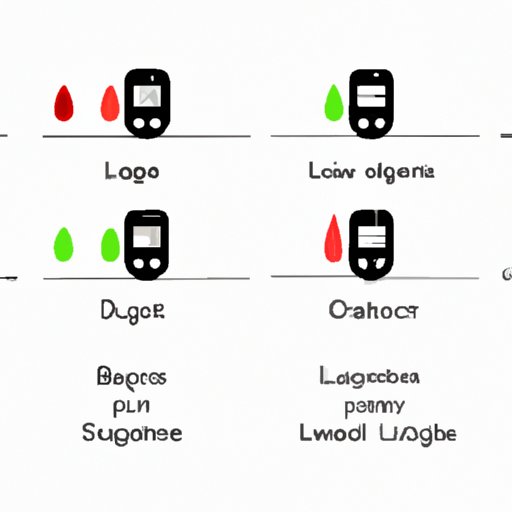
I. Introduction
Low blood sugar, also known as hypoglycemia, is a condition that is characterized by a decrease in the amount of glucose in the bloodstream. It is a common problem for people with diabetes, but can also occur in individuals who do not have diabetes. However, low blood sugar during sleep can be particularly dangerous and may lead to severe consequences. In this article, we will explore the possibility of dying from low blood sugar in your sleep and how to prevent it from happening.
II. Understanding Low Blood Sugar: What is it and What Causes it?
The normal range of blood sugar levels is between 70 and 110 milligrams per deciliter (mg/dL), but this range may vary depending on the individual and the circumstances. Low blood sugar occurs when the levels drop below 70mg/dL. There are several causes of low blood sugar, including too much insulin, skipped meals, alcohol intake, certain medications, and excessive physical activity. When blood sugar levels drop too low, the body is unable to function properly, leading to symptoms such as confusion, dizziness, shakiness, and in severe cases, loss of consciousness.
III. Can Low Blood Sugar Actually Lead to Death While Sleeping?
During nighttime hypoglycemia episodes, the pancreas continues to release insulin, but the liver may not produce enough glucose to counteract the insulin. As a result, blood sugar levels can drop dangerously low, which may potentially lead to death. The risks associated with low blood sugar episodes during sleep are significant, especially in individuals with diabetes who are more prone to such episodes. However, death related to low blood sugar in sleep is relatively rare.
IV. Symptoms to Watch Out for When Your Blood Sugar Drops During Sleep
Common symptoms of nighttime hypoglycemia include sweating, shaking, nightmares, and confusion. However, symptoms may vary from person to person. It is crucial to recognize the early signs of low blood sugar to prevent severe cases. In some people, low blood sugar can cause unusual symptoms, such as feeling cold or hot, irritability, or difficulty concentrating.
V. Managing Low Blood Sugar Levels: What Experts Advise
The best way to prevent low blood sugar levels during sleep is to maintain a consistent level of glucose in the bloodstream. It is recommended to eat smaller meals or snacks throughout the day instead of three large meals. Also, it is essential to check blood sugar levels regularly and take medications as directed by the healthcare provider. Physical activity can help to lower blood sugar levels, but it’s crucial to balance it with proper nutrition. Drinking alcohol on an empty stomach should be avoided, as it can lead to a sudden drop in blood sugar levels.
VI. Tools and Devices to Help Prevent Low Blood Sugar Episodes When Sleeping
Several technologies and devices are designed to help individuals with diabetes manage their blood sugar levels during sleep. Continuous glucose monitors (CGMs) can track blood sugar levels around the clock, sensing any significant changes. Closed-loop insulin delivery systems, known as artificial pancreas systems, are devices that use CGMs and smart algorithms to adjust insulin levels automatically. These devices can prevent nighttime hypoglycemia episodes and, in turn, prevent life-threatening situations.
VII. Preventing Bedtime Blood Sugar Crashes with Dietary Changes
Maintaining a balanced and healthy diet can help prevent hypoglycemia during sleep. It is essential to consume enough carbohydrates and time meals and snacks appropriately. Eating slowly-digesting carbohydrates such as whole-grain bread or pasta before bedtime can help prevent low blood sugar episodes during sleep. Additionally, consuming protein-rich foods can help keep blood sugar levels stable throughout the night.
VIII. Lessons Learned from People Who’ve Experienced Nighttime Hypoglycemia
People who have experienced nighttime hypoglycemia may have valuable insights and lessons to share. It is crucial to recognize early signs of low blood sugar levels and to seek medical attention if necessary. Staying informed and educated about diabetes management and its challenges can help individuals prevent severe complications.
IX. Conclusion
In conclusion, low blood sugar during sleep can be dangerous and may potentially lead to death. However, with proper management and monitoring, the risks associated with nighttime hypoglycemia episodes can be significantly reduced. Maintaining a healthy lifestyle, taking medications as prescribed, and utilizing innovative technologies can help individuals with diabetes prevent low blood sugar levels during sleep. It is also vital to recognize early symptoms and seek medical attention when necessary to avoid complications.




